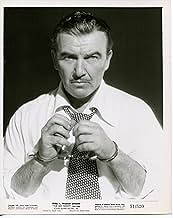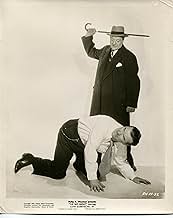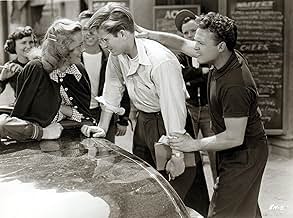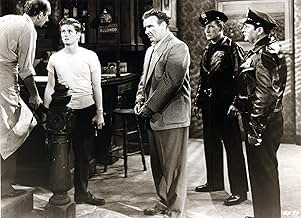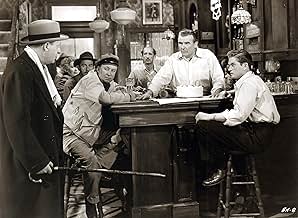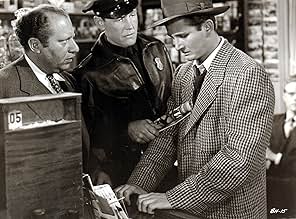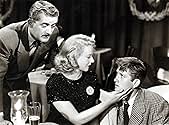IMDb RATING
6.3/10
1.3K
YOUR RATING
A teenager comes of age while seeking revenge on the man who beat up his father.A teenager comes of age while seeking revenge on the man who beat up his father.A teenager comes of age while seeking revenge on the man who beat up his father.
John Drew Barrymore
- George La Main
- (as John Barrymore Jr.)
Howland Chamberlain
- Flanagan
- (as Howland Chamberlin)
Emile Meyer
- Peckinpaugh
- (as Emil Meyer)
Mauri Leighton
- Terry Angelus
- (as Mauri Lynn)
Robert Aldrich
- Ringsider at Fight
- (uncredited)
Walter Bacon
- Boxing Match Spectator
- (uncredited)
Benjie Bancroft
- Bar Patron
- (uncredited)
Robert Bice
- Taxi Driver
- (uncredited)
Willie Bloom
- Boxing Match Spectator
- (uncredited)
Chet Brandenburg
- Boxing Match Spectator
- (uncredited)
Lane Chandler
- Printer
- (uncredited)
Edmund Cobb
- Cop
- (uncredited)
Featured reviews
Joseph Losey's The Big Night is a film noir that's also, like Moonrise and Talk About A Stranger, a coming-of-age story. The young male undergoing his transformational journey is John Barrymore, Jr., son of the Great Profile and father of Drew. His film career was not high-profile, as he inherited the family disposition toward chemical dependency (blood will tell). But here, boasting a luxuriantly healthy crown of hair, he gives a surprisingly intense yet controlled performance. His big night happens to be his 16th or 17th birthday, when his barkeep father is brutally beaten and publicly humiliated by a local sportswriter (Losey's staging is unflinching). Frustrations about his own Hamlet-like ditherings and confusions impel him to seek revenge on his father's behalf, and, gun in pocket, he sets out into a nightscape of prize fights, gin mills and the walk-up flats of casually met strangers. While Losey's sympathies lie with Barrymore, it's always clear that the emergent man is still a callow stripling, incapable of apprehending the complex reality he crashes into, like a fatted calf in a china shop. Though the director refrains from pushing the conclusion to where it might logically go -- he retreats into sentimentality and sententiousness -- The Big Night still scores as a provocative, moodily shot film.
As someone who knew John Barrymore Jr. 25 years ago, I was heartbroken to see him early in his aborted film career. Though not as charismatic as James Dean would be just a couple of years later, he was certainly Dean's prototype in The Big Night. Perhaps with a better film and a less disturbed personality, Barrymore might have been a working Hollywood actor for many years to come. Anyway, what director Joseph Losey lacked here was the Los Angeles cityscape he used to full effect that same year in his retelling of Fritz Lang's M. The Big Night was screaming for a location project on downtown L.A.'s seedy, beaten down Bunker Hill, a neighborhood of crumbling Victorian mansions and apartment buildings with vertiginous stairways that provided so much atmosphere to other films, such as Kiss Me Deadly, Criss-Cross, The Exiles and, yes, M. Instead, the movie is stage bound and hemmed in by sets that never look convincing. With its rambling "a night in the life" plot line, The Big Night needed another character: a dark city of real streets, background lights, rambling old house, and dingy clubs and bars. In other words, the kind of verisimilitude that transports the viewer into the protagonist's world. The back lot, unfortunately, was a poor stand-in.
The story here is revenge, more real-life based, a 1950's version of the crime of passion. A teenager's good-hearted father is beaten to a pulp by a gangster, so the kid invades the streets to get some payback. The father's not worried about the floor-wiping, which leads to a mystery behind the teen's mother, who skipped out on the family long ago, and a woman the father knows who has committed suicide.
Seeing this film, there's not much in terms of plot, but there are some notable scenes, particularly when the kid hears a beautiful night-club singer, becomes entranced, gets a chance to meet her on the street, and tells her how beautiful she is. Even though she's, you know,
black. The pain in the singer's face rends the poor kid, who was transported by her voice, but can't get beyond her skin color.
This film also has one of THE great lines ever in any film noir or any movie period, at least concerning the tragedy between a man and a woman, when there is love involved. There are no words more powerful or poignant, especially for a man who loves a woman beyond reason, who knows he has lost the love of his life. Unable to move on, to love or marry another woman after that one woman has destroyed him, and in fact still very much in love with his destroyer,
Preston Foster tells his son, "Sometimes a man loves one woman in the whole world. If she turns out to be the wrong one, well...that's just tough." Truly, the heart of noir is not blackness, but the white-hot scars of passion.
Seeing this film, there's not much in terms of plot, but there are some notable scenes, particularly when the kid hears a beautiful night-club singer, becomes entranced, gets a chance to meet her on the street, and tells her how beautiful she is. Even though she's, you know,
black. The pain in the singer's face rends the poor kid, who was transported by her voice, but can't get beyond her skin color.
This film also has one of THE great lines ever in any film noir or any movie period, at least concerning the tragedy between a man and a woman, when there is love involved. There are no words more powerful or poignant, especially for a man who loves a woman beyond reason, who knows he has lost the love of his life. Unable to move on, to love or marry another woman after that one woman has destroyed him, and in fact still very much in love with his destroyer,
Preston Foster tells his son, "Sometimes a man loves one woman in the whole world. If she turns out to be the wrong one, well...that's just tough." Truly, the heart of noir is not blackness, but the white-hot scars of passion.
Lots of accused Communists involved in this film, and one spy!
Yes - John Barrymore Jr. Was paid and given an expense account to spy on poor Joseph Losey, the director. Barrymore later confessed to Losey, who forgave him, and the two enjoyed fabulous meals on Barrymore's FBI expense account.
George La Main (John Drew Barrymore) is Georgie, who watches his father caned and beaten brutally by a sportswriter, Al Judge. We don't know why, just that he takes it.
Georgie, only 17, is traumatized and wants revenge. This quest takes him to a prize fight, nightclubs, and apartments in walk-ups in the seedier parts of Los Angeles as apropos the noir atmosphere. What Georgie learns will take him out of his youth. It's disillusioning but it's reality, like it or not.
This is Losey's last film before blacklisting causes him to leave the country. The role of Georgie is a James Dean-type role. Georgie is portrayed as kind of a dork though Barrymore was better looking than this. He does a good job as the tortured young man.
Preston Foster, Howard St. John, Joan Lorring, and Dorothy Comingore (in her last role) provide good support.
In the end, the film, though uneven, shows that secrets and lies can hurt, and people can betray and disappoint you; sadly, it's all part of life's tapestry.
Certainly no one knew that better than Losey, the ruined Comingore, uncredited writers Lardner and Butler, and actor Howard Chamberlin, all part of this film and blacklisted.
Yes - John Barrymore Jr. Was paid and given an expense account to spy on poor Joseph Losey, the director. Barrymore later confessed to Losey, who forgave him, and the two enjoyed fabulous meals on Barrymore's FBI expense account.
George La Main (John Drew Barrymore) is Georgie, who watches his father caned and beaten brutally by a sportswriter, Al Judge. We don't know why, just that he takes it.
Georgie, only 17, is traumatized and wants revenge. This quest takes him to a prize fight, nightclubs, and apartments in walk-ups in the seedier parts of Los Angeles as apropos the noir atmosphere. What Georgie learns will take him out of his youth. It's disillusioning but it's reality, like it or not.
This is Losey's last film before blacklisting causes him to leave the country. The role of Georgie is a James Dean-type role. Georgie is portrayed as kind of a dork though Barrymore was better looking than this. He does a good job as the tortured young man.
Preston Foster, Howard St. John, Joan Lorring, and Dorothy Comingore (in her last role) provide good support.
In the end, the film, though uneven, shows that secrets and lies can hurt, and people can betray and disappoint you; sadly, it's all part of life's tapestry.
Certainly no one knew that better than Losey, the ruined Comingore, uncredited writers Lardner and Butler, and actor Howard Chamberlin, all part of this film and blacklisted.
The tale is based on an obscure novel called The Dreadful Summit by author/screenplay-writer Stanley Ellin. The script for the film appears to be a jumbled mess, but each segment has great independent value that is the result of an intelligent Losey touch. The lovely remarkable scenes are the following:
A. Young bespectacled George bullied by friend to kiss a girl whom he likes B. A birthday cake with lighted candles given by his father that George is unable to blow out in full, One remains lit ominously. The cake serves as a reminder that the entire film deals with happenings of a single day. At the last scene the cake reappears to remind us of it. C. What appears to be real is proved unreal time and time again. D. The left-sympathizing Losey and friends made the film with a cleverness missing in other films of the day. Closure of the bars's curtains by the assistant to George's dad is a symbolic in an odd way. E. The small bitter role given to the enigmatic "2nd Mrs Citizen Kane" (Dorothy Comingore) as Julie Rostina, after she was hounded out in real life by Randolph Hearst and then the awful McCarthy witch hunt of alleged communists in Hollywood that followed states a story within a story. It is sad the way she died in real life. She had so much potential as an actress. F. The honest appreciation of beauty and talent of a black singer by George leads to so much bitterness of color-based prejudices. Losey adds a black poodle in chains in that scene. G The two kisses of George in the film are so different (the opening sequence and later one with Marion)
These sequences are all wonderful, though the film never comes together. Yet it is a notable statement of undying love by a husband for his wayward wife and also of a motherless young man trying to love women and eventually grow up to be a good husband.
A. Young bespectacled George bullied by friend to kiss a girl whom he likes B. A birthday cake with lighted candles given by his father that George is unable to blow out in full, One remains lit ominously. The cake serves as a reminder that the entire film deals with happenings of a single day. At the last scene the cake reappears to remind us of it. C. What appears to be real is proved unreal time and time again. D. The left-sympathizing Losey and friends made the film with a cleverness missing in other films of the day. Closure of the bars's curtains by the assistant to George's dad is a symbolic in an odd way. E. The small bitter role given to the enigmatic "2nd Mrs Citizen Kane" (Dorothy Comingore) as Julie Rostina, after she was hounded out in real life by Randolph Hearst and then the awful McCarthy witch hunt of alleged communists in Hollywood that followed states a story within a story. It is sad the way she died in real life. She had so much potential as an actress. F. The honest appreciation of beauty and talent of a black singer by George leads to so much bitterness of color-based prejudices. Losey adds a black poodle in chains in that scene. G The two kisses of George in the film are so different (the opening sequence and later one with Marion)
These sequences are all wonderful, though the film never comes together. Yet it is a notable statement of undying love by a husband for his wayward wife and also of a motherless young man trying to love women and eventually grow up to be a good husband.
Did you know
- TriviaAccording to interviews that director Joseph Losey gave in the mid-1970s to Michel Ciment, the FBI wanted to spy on him in Europe, where he relocated to work after being blacklisted by Hollywood because of his political activities. So they paid John Drew Barrymore (who became a good friend after this movie) to furnish information about Losey's political activities, if any, in London. Barrymore later met Losey in London and confessed to him about the money and expense account the FBI had given him to spy on Losey. Losey, recalling that the young actor had been under tremendous pressure at the time, forgave him and, in fact, suggested that they have several lavish meals together and put the cost on Barrymore's FBI expense account, which they promptly did.
- GoofsThe magazine racks outside the corner store are mostly issues contemporary to 1951, with one glaring exception. A copy of the famous first issue of The New Yorker (published in 1925).
- Quotes
Peckinpaugh: Next time you see somebody drop money, don't think about it so long before you decide to give it back.
- ConnectionsFeatured in Vampira: The Big Night 1951 (1956)
- How long is The Big Night?Powered by Alexa
Details
- Release date
- Country of origin
- Language
- Also known as
- The Big Night
- Filming locations
- 218 East 12th Street, Downtown, Los Angeles, California, USA(George goes to the old St. Joseph's Church - destroyed by fire and demolished in 1983)
- Production company
- See more company credits at IMDbPro
- Runtime
- 1h 15m(75 min)
- Color
- Aspect ratio
- 1.37 : 1
Contribute to this page
Suggest an edit or add missing content



